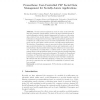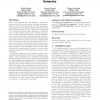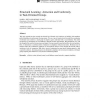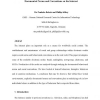MIDDLEWARE
2010
Springer
13 years 10 months ago
2010
Springer
Recent Internet applications, such as online social networks and user-generated content sharing, produce an unprecedented amount of social information, which is further augmented b...
IGPL
2010
13 years 10 months ago
2010
Hegselmann and Krause have developed a simple yet powerful computational model for studying the opinion dynamics in societies of epistemically interacting truth-seeking agents. We...
CE
2008
13 years 10 months ago
2008
This empirical paper shows how free/libre open source software (FLOSS) contributes to mutual and collaborative learning in an educational environment. Unlike proprietary software,...
CIKM
2010
Springer
13 years 10 months ago
2010
Springer
Online social networks offer opportunities to analyze user behavior and social connectivity and leverage resulting insights for effective online advertising. We study the adopti...
CHI
2010
ACM
13 years 10 months ago
2010
ACM
People share pictures online to increase their social presence. However, recent studies have shown that most of the content shared in social networks is not looked at by peers. Pr...
NETWORK
2008
13 years 11 months ago
2008
One of the most compelling social questions, which until now was left unanswered by current technology, is "Who's that?" This question is usually asked about a new ...
CMOT
1999
13 years 11 months ago
1999
This study extends previous research that showed how informal social sanctions can backfire when members prefer friendship over enforcement of group norms. We use a type of neural...
IJHCI
2002
13 years 11 months ago
2002
The Internet plays an important role as a means for worldwide social contact. The establishment and maintenance of social and group relationships within electronic worlds require ...
IJKL
2007
13 years 11 months ago
2007
: In what sense, then, can it be said that contemporary societies are becoming more and more dependent on the production, dissemination and use of knowledge? Are we witnessing a ch...
JASIS
2000
13 years 11 months ago
2000
: This paper argues that professional discourses tend to align themselves with dominant ideological and social forces by means of language. In twentieth century modernity, the use ...




